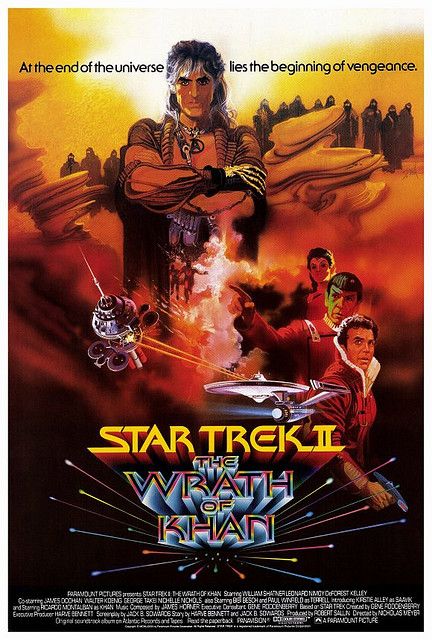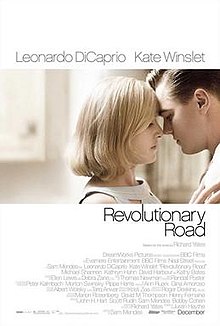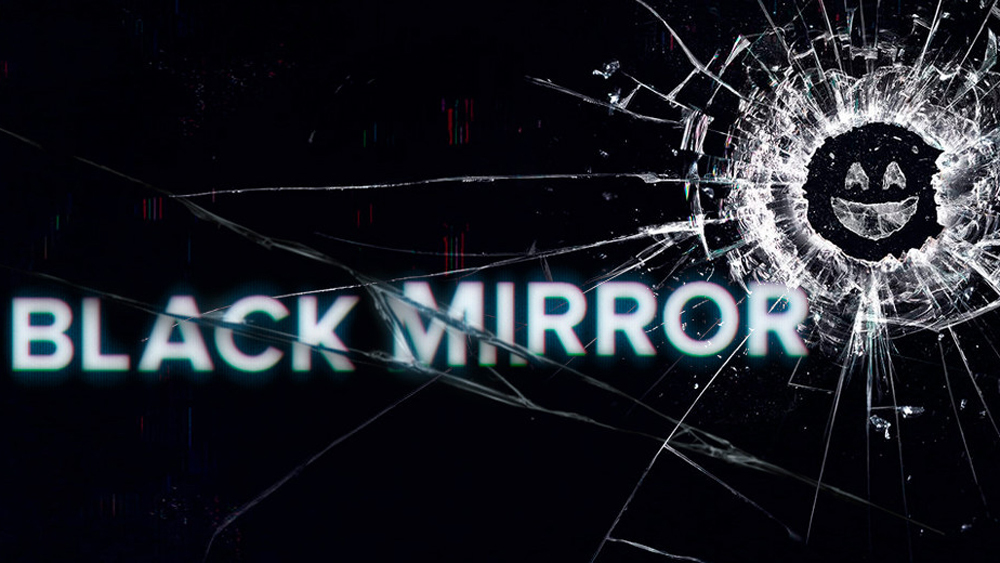Now Playing
Current DJ: CHIRP DJ
illuminati hotties Knead from Let Me Do One More (Snack Shack Tracks/Hopeless) Add to Collection
Requests? 773-DJ-SONGS or .(JavaScript must be enabled to view this email address)
Welcome to The Fourth Wall, CHIRP's weekly e-conversation on cinema. This week's subject is the sci-fi classic Star Trek II: The Wrath of Khan.
This edition is written by CHIRP Radio volunteers Kevin Fullam and Clarence Ewing.
 Clarence:
Clarence:
Even after over 60 years, 13 movies, 7 television series, and a galaxy of non-canon books, comics and Internet fan fiction, Star Trek II: The Wrath of Khan (1982), remains THE Star Trek story in many fans' minds. The story is actually pretty basic: take one iconic starship captain (William Shatner) and pit him and his crew in a pitched battle against a quintessential nemesis (Ricardo Montalbán) who's seeking ultimate payback for a past defeat and exile. Many lives are in the balance, and before it's over, there will be tragedy on both sides.
It’s been more than 30 years since the release of Star Trek II: the Wrath of Khan, and it remains a jewel in the crown of science-fiction cinema, cementing one of the first mega-successful attempts at adapting a TV show into a film. Of course, the main pull quote from that film, Captain Kirk’s rage-filled retort to his arch-enemy (“KHAAAAAAAAAAAAAN!!!”) has been parodied and referenced in other movies and TV shows ad infinitum. But there’s so much more.
The general consensus is that of all the Star Trek movies, Khan is the best. I feel in this regard the public's view is spot on, even when comparing it to the stunning special effects of the recently rebooted Trek (alternate) universe. This movie carries a resonance that isn’t there with most, if not all, of the other Star Trek films. And I think it does so for these reasons:
It’s an all-around great story. Khan isn't just about spaceships waging battle. Just as important are the themes of friendship, revenge, aging, and past mistakes coming back to bite you in the ass. It helps that the cast had a few years to work together on the TV series so they could get to know the characters and build relationships that they could carry to the big screen.
It’s Shakespeare in space. The most successful lead actors in the Star Trek franchise tend to be the ones who have a lot of experience performing Shakespeare, where the ability to generate powerful emotions while standing next to cardboard cutout scenery is a must. Subtlety and irony is not what’s required in a space opera. William Shatner and Ricardo Montalbán understood this and set the tone perfectly.
You don’t need to be a Trekkie to follow what’s going on. Other movies in the Star Trek franchise require more than a little background knowledge to fully appreciate the current story being told. An audience member doesn’t have to know that Khan is basically a sequel to an original Star Trek episode (“Space Seed,” Season 1, Ep. 22) in order to understand what’s going on. A cursory knowledge of what Star Trek is is all that’s required.
Welcome to The Fourth Wall, CHIRP's weekly e-conversation on cinema. This week's subject is the film The Last Seduction.
This edition is written by CHIRP Radio volunteers Kevin Fullam and Shawna Kaiser.
 Kevin:
Kevin:
Hang on to your heart, your wallet, and your life -- if Bridget Gregory of The Last Seduction is in town, all three are at risk. Was it a victory for feminism to see a female cinema protagonist that was as ruthless as any male to grace the screen? Let's discuss...
-----
In the annals of Neo-noir, The Last Seduction may have traveled one of the oddest paths to glory. First aired by HBO in 1994 before the channel garnered its current status as a purveyor of high-brow television, Seduction was originally pitched as a throwaway "skin-e-max" (in the words of screenwriter Steve Barancik) flick. Lo and behold, a quality piece of cinema emerged, powered by a stunning performance from lead Linda Fiorentino as the aforementioned Ms. Gregory. The film was then ushered into the box office for a brief run (grossing over $5 million) and garnered a four-star review from Roger Ebert, who listed the movie on his Top 10 list for the year. However, despite generating serious Oscar buzz, Fiorentino was ruled ineligible by the Academy because the film had aired on cable before arriving in theaters.
The plot in a nutshell: Bridget is married to Clay (Bill Pullman), a shady would-be doctor who's dealing drugs in order to pay back a loan shark. After a big score, the couple quarrel; Clay hits Bridget, and she decides to hightail out of NYC -- with their $700,000. Bridget bunkers down in a suburb of Buffalo until her divorce goes through, while Clay (now in serious physical danger from Mr. Loan Shark) hires private eye Harlan (Bill Nunn) to find his wife and recover the loot.
Welcome to The Fourth Wall, CHIRP's weekly e-conversation on cinema. This week's subject is the 2008 movie Revolutionary Road.
This edition is written by CHIRP Radio volunteers Kevin Fullam and Clarence Ewing.
 Kevin:
Kevin:
The honeymoon is over. Now what?
Throughout much of Hollywood's history, it seems that marriage (especially the wedding) has been utilized as a feel-good capper on many a love story. It's practically a requisite for any traditional rom-com film, right? These tales are usually told from a female perspective*, where the heroine sets out to nab her beau, and the pair ride off into the scripted sunset, either just pre- or post-altar festivities.
[*though certainly not always -- but interestingly, similarly-styled relationship films with male leads (say, High Fidelity) are seldom referred to as romantic comedies.]
I've often wondered how much of an impact these messages have on our own desire to get hitched? The pressure comes from all sides in American culture: mass media, religion... hell, even the tax code subtlety encourages it. But for decades, scant attention was paid to the discarded husks of marriages gone wrong. And with a divorce rate estimated at around 50%, we have no shortage of fractured homes in the good ol' United States.
Celluloid has caught up in recent decades, with tales about the nightmare of child-custody battles (Kramer vs. Kramer), to the insanity of knockdown, drag-out enmity (War of the Roses). But I'm not sure that any film has done a better job of illustrating the Descent Into Marital Despair that's featured in Revolutionary Road.
Welcome to The Fourth Wall, CHIRP's weekly e-conversation on cinema. This week's subject is the Netlix series Altered Carbon.
This edition is written by CHIRP Radio volunteers Kevin Fullam and Clarence Ewing.
 Clarence:
Clarence:
In the Netflix series Altered Carbon (based on the Richard K. Morgan 2002 novel), highly trained killing specialist Takeshi Kovacs is shot to death in a hotel room for some reason. But it’s OK, because in his world, human consciousness can be downloaded and transferred between human bodies, which are lovingly referred to as “sleeves.”
Logan... pardon me, Kovacs...is revived hundreds of years after his “death” to solve a rich man’s murder, because rich people can pretty much do whatever they want to whomever they want.
Along with a motley collection of allies/cyperpunk sidekicks, Deckard... sorry, Kovacs...has to figure out who killed the rich man who’s not really dead (because science) in order to win the freedom to wander around moping about all the violence stuff he’s done in his many pasts.
Welcome to The Fourth Wall, CHIRP's weekly e-conversation on cinema. This week's subject is Season 4 of the Netflix series Black Mirror.
This edition is written by CHIRP Radio volunteers Kevin Fullam and Clarence Ewing.
 Kevin:
Kevin:
Here's a thought experiment, Clarence:
Imagine that you're in possession of a super-duper computer that is able to run those "simulated worlds" so often discussed among intelligentsia these days. (Summary: how do we know that we'renot living in a simulated world as opposed to "reality?" Answer: we don't.) You've got a thousand Clarence Ewings floating around in this magic box, all living out variants of your own life. However, here's the twist -- you can somehow drain their resources for your own use. Come down with a kidney problem? You can purchase pristine health at the cost of kidney failure for one of your sims. Short on cash? One of your sims suffers a financial calamity, while you reap the benefits. They won't have any clue as to why it's happening -- after all, bad luck befalls everyone sometimes, right?
Would you want such a device? What are the ethical obligations involved in dealing with these virtual beings? They may not be "real," but life sure does feel real to them... so, does the difference matter?